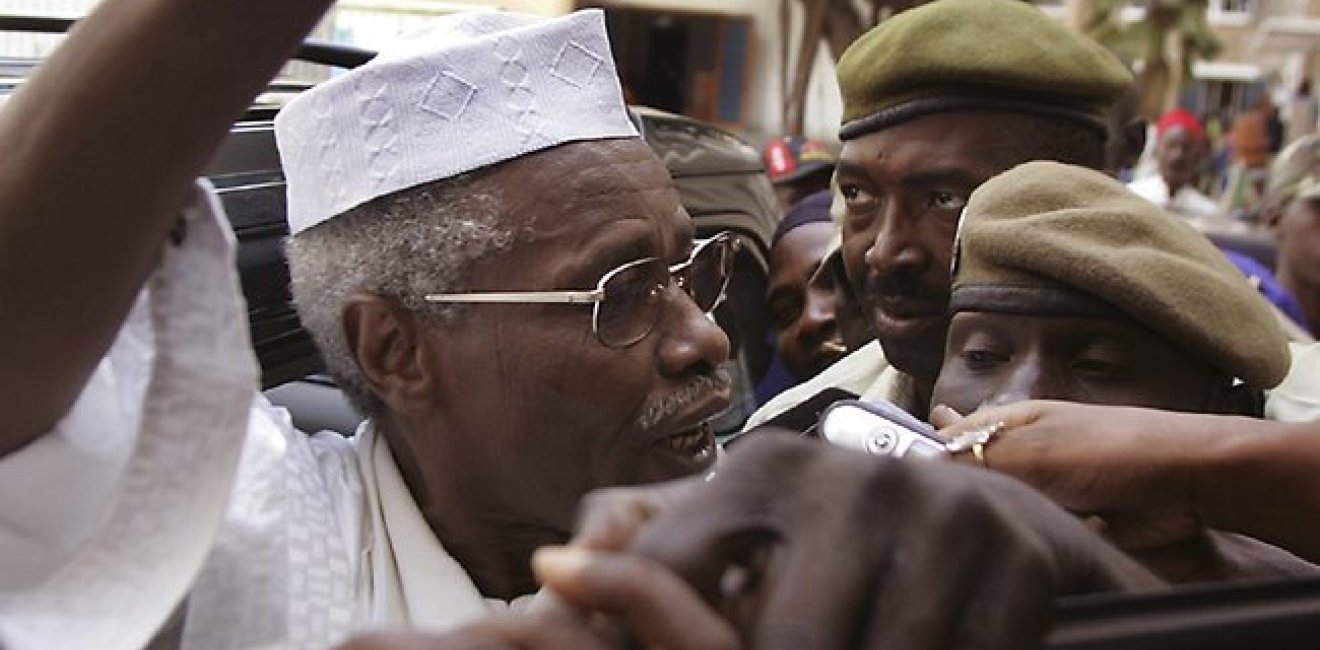
A blog of the Africa Program
French Translation of the Week
Accused of crimes against humanity, war crimes and torture, Hissène Habré, the former Chadian president considers himself to be a victim of a conspiracy. A defense strategy that did not prevent him for being charged...
Since the first complaints against him in Dakar in January 2000, he made a vow of silence. In thirteen and a half years, Hissène Habré only expressed himself once with regards to the judicial proceedings against him. President Abdoulaye Wade was threatening to extradite him to Chad in July 2011 but then changed his mind. Facing three Senegalese journalists from the Gazette, the former Chadian leader, speaking of himself in the third person, had given a perfect example of his defense strategy, rejecting in advance the legitimacy of those who claim to judge him.
"Accusé de crimes contre l'humanité, de crimes de guerre et de torture, Hissène Habré, l'ancien président tchadien se dit victime d'une conspiration. Une stratégie de défense qui n'a pas empêché son inculpation...
Depuis les premières plaintes déposées contre lui à Dakar en janvier 2000, il avait fait voeu de silence. En treize ans et demi, Hissène Habré ne s'est exprimé qu'une seule fois sur la procédure judiciaire dont il fait l'objet. C'était en juillet 2011, alors que le président Abdoulaye Wade menaçait de l'extrader vers le Tchad il se ravisa ensuite. Face à trois journalistes sénégalais de La Gazette, l'ancien dirigeant tchadien, parlant de lui à la troisième personne, avait donné un parfait exemple de ce qui est depuis le début sa stratégie de défense, récusant par avance la légitimité de ceux qui prétendent le juger."
This article has been translated from French. Click here to read the original version on Jeune Afrique
Calling the proceedings against him a "plot with political and financial ramifications covered under the mantle of a court case," he implicated six heads of state including Idriss Deby, his successor, the French François Mitterrand, Jacques Chirac and Nicolas Sarkozy, the Senegalese Abdoulaye Wade and Libya's Muammar Gaddafi.
Locked again in silence, Habré has subsequently left his lawyers and many his faithful followers in Senegal to express his discontent. On January 22, just before the inauguration of the extraordinary African Chambers set up by Senegal and the African Union (AU) to investigate his case, François Serres, Habré's French lawyer, sent an open letter to President Macky Sall letter in which he accused "The judicial system being set up makes President Deby the chief investigator of the trial."
For Mr. El Hadj Diouf, the Senegalese lawyer who has been defending him since the first day, the charges against his client fall under "treason." And he denounced once again a vast coalition of "enemies" suspected to maneuver against Habré. For the occasion, Fatimé Raymonde Habré, one of the former president's two wives, has added her voice to the chorus of indignation. According to her, the extraordinary African Chambers are nothing less than "an administrative committee paid by Idriss Deby," and the complaints filed by Chadian prison survivors "a big operation of settling accounts, made up and presented to the public as a struggle against impunity."
Autistic defense
Trapped in a system of autistic defense that compiles many testimonials, mass graves or archives exhumed in N'Djamena, Hissène Habré's bodyguards continue to elevate their hero to the rank of martyr of Western imperialism.
On July 2, after a series of political and legal twists that lasted more than thirteen years, successively involving Senegalese and Belgian judiciaries, the AU and the Court of Justice of the Economic Community of the States of Africa West (ECOWAS), Habré ended up being charged with crimes against humanity, war crimes and torture, to the great satisfaction of victims and organizations defending human rights, which were mobilized.
After refusing to answer questions from the judge, the former head of state, who faces up to thirty years in prison, awaits for the ultimate outcome of his appeal at the prison unit the hospital Le Dantec in Dakar. His case was introduced in April before the Court of Justice of ECOWAS and he is obviously seeking to establish the ineptitude of the African extraordinary Chambers.
Article translated by Germaine Touna Mama, Staff Intern for the African Program at the Wilson Center
Photo attributed to Schalk van Zuydam /AP Former Chad dictator Hissene Habre seen leaving court in Senegal where he has lived in exile for over 20 years.

Africa Program
The Africa Program works to address the most critical issues facing Africa and US-Africa relations, build mutually beneficial US-Africa relations, and enhance knowledge and understanding about Africa in the United States. The Program achieves its mission through in-depth research and analyses, public discussion, working groups, and briefings that bring together policymakers, practitioners, and subject matter experts to analyze and offer practical options for tackling key challenges in Africa and in US-Africa relations. Read more

Explore More in Africa Up Close
Browse Africa Up Close
The Innovative Landscape of African Sovereign Wealth Funds



